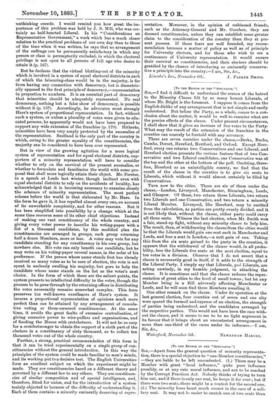[TO THE EDITOR OY THE " SPECTATOR:1
SIR,—I find it difficult to understand the reason of the hatred to the Minority Clause felt by so many honest Liberals, of whom Mr. Bright is the foremost. I suppose it comes from the English dislike of any arrangement that is not simple and easily understood. But before the Party, as a whole, comes to a con- clusion about the matter, it would be well to examine what are the precise effects of the clause. Under present circumstances, I shall show that it gives an increase of five votes to the Party- What may the result of the extension of the franchise in tha counties can scarcely be foretold with any accuracy.
There are seven counties under the clause,—Berks, Bucks, Cambs, Dorset, Hereford, Hertford, and Oxford. Except Here- ford, every one returns two Conservatives and one Liberal, and Hereford election presents the curious feature that of two Con- servative and two Liberal candidates, one Conservative was at' the top and the other at the bottom of the poll. Omitting, there fore, Hereford as an unintelligible county, we find that the result of the clause in the counties is to give six seats to Liberals, which without it would almost certainly be filled by Conservatives.
Turn now to the cities. There are six of them under the clause,—London, Liverpool, Manchester, Birmingham, Leeds,
and Glasgow. Of these, two return three Liberals, two return two Liberals and one Conservative, and two return a minority Liberal Member. Liverpool, like Hereford, may be omitted from the calculation, as parties are pretty evenly divided, and it is not likely that, without the clause, either party could carry
all three seats. Witness the last election, when Mr. Smith won a fair, stand-up fight, without any minority clause to help him.
The result, then, of withdrawing the clause from the cities would be that the Liberals would gain one seat each in Manchester and Leeds, and lose a seat in London,—a nett gain of one. Taking this from the six seats gained to the party in the counties, it appears that the withdrawal of the clause would, in all proba- bility, lose the Liberals five seats at the next election, equal to ten votes in a division. Observe that I do not assert that a clause is necessarily good in itself, if it adds to the strength of
the Liberal Party. I simply say that Liherals, quit Liberals, are acting unwisely, in my humble judgment, in attacking the clause. It is sometimes said that the clause reduces the repre- sentation of great cities to the level of small towns ; but let any Member bring in a Bill adversely affecting Manchester or Leeds, and he will soon find three Members assailing it.
One other remark on the clause. Under its operation at the last general election, four counties out of seven and one city were spared the turmoil and expense of an election, the strength of parties being understood. and the candidates arranged by the respective parties. This would not have been the case with- out the clause, and it seems to me to be no light argument in its favour that it brings about an uncontested arrangement in more than one-third of the cases under its influence.—I am, Sir, &c.,


































 Previous page
Previous page